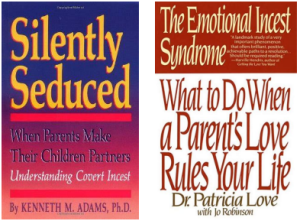Covert incest

Covert incest also known as emotional or psychic incest is a highly questionable psychiatric concept from the 1980s and 90s, still used by therapists (many of them anti-incest feminists and Jungians/Psychotherapists) to pathologize and sexualize both functional and dysfunctional aspects of family life. It has been criticized as an attempt to reify novel forms of "abuse", unduly expanding the definition of Child Sexual Abuse.[1][2][3]
In concept, covert incest is abuse in which a parent looks to their child for the emotional support that would be normally provided by another adult. While the activities involved are not sexual, the effects of covert incest on children when they become adults are said to mimic actual incest, although sometimes to a lesser degree. Psychotherapist Roni Weisberg-Ross has noted that the term may not be particularly useful, since it can lead to attributing nearly any possible dysfunctional relationship or problem, becoming "a catchall, watered-down diagnosis". Ross also criticizes the term for its emphasis on children meeting parents' "unmet needs", noting that children often meet the emotional or other needs of parents, with relationship boundaries frequently blurring and no definition of when this leads to permanent damage or harm.[4]
External Links
- The Fiction of Covert Incest - Medium.
Sympathetic literature
- Covert incest - The Wikipedia has not yet been touched by psychiatry skeptics. Various sources listed.
- Marion Woodman - Example of a scholar/pseudoscientist who promotes the concept.
References
- ↑ Pendergrast, Mark (1996). Victims of memory: sex abuse accusations and shattered lives, Hinesburg, Vt: Upper Access.
- ↑ Bjorklund, David F. (2000). False-memory creation in children and adults: theory, research, and implications, Hillsdale, N.J: L. Erlbaum.
- ↑ Kaminer, Wendy (1993). I'm dysfunctional, you're dysfunctional: the recovery movement and other self-help fashions, New York: Vintage Books.
- ↑ Weisberg-Ross, Roni (January 1, 2012). "Covert/Emotional Incest - How Real Is It?". Ezine.